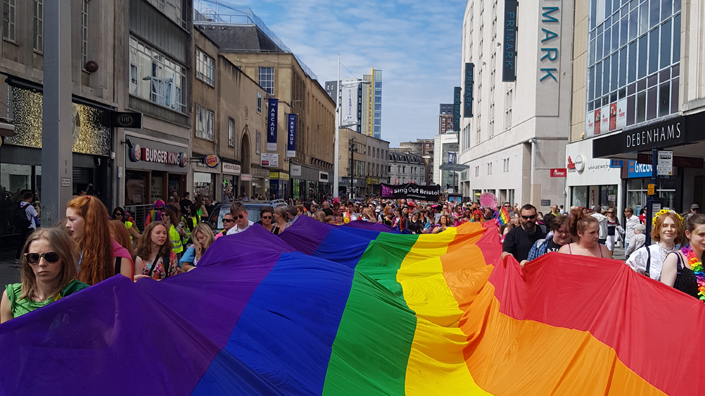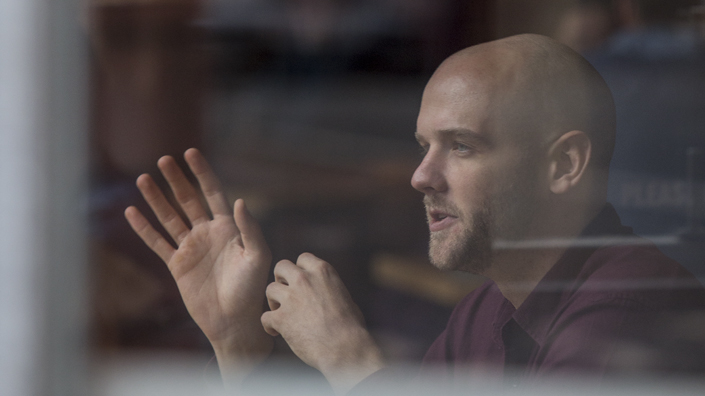With his sister’s wedding approaching, Ben Murphy decided to come out to his parents.
He needed to tell them his date would be a man. Having already informed his friends and both his sisters, he typed up a text message to his father. It was 2013 and emojis weren’t a thing yet but, had they been, he might well have used some.
“OK, see you at the wedding,” came the reply.
Growing up in Townsville, in Queensland, Australia, Murphy went to a Catholic school, wrestled with his identity as a teenager and was out by his early twenties. There was a lot of difficult repression and he was aware of the homophobia around him – it had a way of accumulating in his mind – but he experienced no crushing fear of discrimination or threats of hellfire from preachers. His “amazing” family and friends accepted him.
Being gay did not hold Ben back from anything he wanted to achieve, which is what makes him an unlikely champion of diversity and inclusion in engineering.
An amateur philosopher who listens to The Dandy Warhols, Murphy studied mechanical engineering and art, and landed a job with the Babcock International Group five years ago.
He moved from Australia to Britain with the company’s graduate programme. When he got to Bristol – a maritime city dotted with artworks by the world’s most famous graffiti artist, Banksy – he liked it and decided to stay.
Even in a giant engineering firm that does work with the armed forces, Murphy encountered no hurdles. At work, he has been exposed to only one incident of homophobia, which may have been accidental and which was promptly followed by an apology.
In 2016, inspired by a similar initiative at another company, he decided to launch a network for the lesbian, gay, bisexual and transgender (LGBT) community and their supporters within Babcock. There was no resistance from management, only encouragement. A year later, a Babcock team was marching in Bristol Pride and a giant rainbow flag was being displayed on the company’s tower.

The Bristol Pride parade (Credit: Daryn Carter)
Murphy makes it all seem so effortless. He shies away from taking credit and says there were many people involved in building the Pride in Babcock network. And yet those around him see a brave man who put up his hand and embarked on a journey, even though he had not personally lived through what many in his community are forced to endure.
“It can be a risk to the individual,” says Mark McBride-Wright, chair of InterEngineering and managing director of EqualEngineers, both of which deal with diversity and inclusion in the sector. “You can become known as ‘that gay engineer’ or ‘that lesbian engineer’, when you just want to be known as a good engineer.”
Greg Turner-Smart, who runs the Prism LGBT network at Rolls-Royce, agrees. “Ben was willing to step up as a role model and to lead a network that enables others to thrive,” he says.
“The engineering sector has a reputation, often unfairly, for having a culture that makes it tough for those that don’t fit the perceived norm. It takes courage to step up and be a leader.”
Daryn Carter, who runs Bristol Pride, says Murphy is an “all-rounder” who has taken on an important and meaningful mission. “Ben is really creative and has the tenacity to make sure things get done.”
After completing Babcock’s graduate programme, Murphy moved into research and development and then into weapons handling. An engineer, who turns 30 in March, he now helps design, build and support the systems that transfer weapons onto submarines. Working with so many restrictions, he enjoys the problem-solving aspect of his job the most.
With Pride in Babcock, Murphy has had to build from the ground up. The project involved everything from defining goals to designing pamphlets. Murphy’s priority is to tackle the core issues in an industry that is actively trying to change, but which is still dominated by “middle-aged, straight, white dudes.”
“We are focusing on acceptance, on making people comfortable to be themselves at work, on making the workplace a welcoming environment,” he says. “We are really young. This is the start of the journey.”

The pride flag at Babcock (Credit: Jennifer Bruce)
A ground-breaking report released last September found that LGBT engineers make up 5% of the industry’s workforce in the UK. The report, published by the Royal Academy of Engineering and entitled Creating Cultures Where All Engineers Thrive, surveyed more than 7,000 engineers and called for a “profession-wide culture change”.
“Our research tells us that engineers who feel included are 80% more likely to report increased motivation and 68% increased performance,” says Bola Fatimilehin, head of diversity and inclusion at the academy. “Everyone works better in an inclusive culture where they experience openness and respect.”
In 2015, a report by Conservative MP Alec Shelbrooke estimated that the industry is losing a potential £11bn a year owing to the lost productivity of LGBT engineers forced to remain in the closet. The report, Engineering Action: Tackling Homophobia in Engineering, found that engineers are afraid to come out and that the industry as a whole is “behind the curve” in terms of LGBT equality.
McBride-Wright says that, by some estimates, nearly half of transgender people (who, according to the Creating Cultures report, make up 1% of UK engineers) have suicidal thoughts or attempt suicide. In a company with 2,000 employees, that means 20 people could, potentially, be in trouble. For a company the size of Babcock, the number would be closer to 350.
He says that, once he has conversations about these issues with company leaders, there is usually a moment of “this could be someone in my team”. From there, real change can begin to happen.
Murphy spends time thinking about this change and the future of engineering. He says that shrinking the skills gap will require a cultural shift to make sure employers are seen as attractive to all engineers, regardless of their sexual orientation or where they fit in on the gender spectrum.
“Looking 20 years ahead, the workforce is ageing and we will need to encourage people into engineering,” he explains. “In Babcock, the more people we employ, the more business we can do.”

Ben Murphy (Credit: Jennifer Bruce)
Similar factors inform Turner-Smart’s initiatives at Prism. “In Rolls-Royce, as with other engineering companies, innovation is critical to our future success,” he says. “Studies show that a diverse workforce is much more innovative, so the importance is absolutely clear to us.”
Living in modern-day Britain, it’s easy to forget how long and difficult the global battle for LGBT equality has been. In many countries, being gay remains outlawed. In Australia, where Murphy was born, same-sex marriage has only been legal for three months. Only 26 countries out of nearly 200 have legalised same-sex marriage, the first doing so 18 years ago.
Even when protected by laws, the LGBT community continues to suffer discrimination, sometimes subtle, sometimes violent. In the workplace, Carter explains, members of the LGBT community can be forced to live “double lives”, which can severely affect their mental health, while discrimination can include being passed up for promotions.
According to research done by Out Now, five in 10 employees don’t feel comfortable coming out at work. The 2011 Injustice at Every Turn report found that 90% of transgender employees had reported some form of harassment.
Murphy says the Pride in Babcock network helps to encourage dialogue and understanding. “How do we have conversations with each other? Give each other space to grow. Recognise that everyone is on a journey and we all have change to make within ourselves and within our organisations,” he adds.
It’s widely agreed that change can take place at all levels. Schools can work to break down gender-based stereotypes about engineering. Professional bodies and institutions can continue to encourage openness. The IMechE, for example, sponsors InterEngineering, while last year the Royal Academy of Engineering was recognised at the Excellence in Diversity Awards for a series of videos profiling LGBT engineers. Companies should be “less cold and more caring”.
“The sector needs to work hard to promote diverse role models, like Ben,” says Turner-Smart. “I see things improving. It’s great to see the support that engineering companies are giving one another. We have collaborated with Airbus, Balfour Beatty, Babcock and others in the last year, and everyone has been open to helping each other improve.”
McBride-Wright says that every engineer interested in driving this change can take a simple first step. “Have an open mind and educate yourself,” he says. “It’s not just about joining Pride parades and flying flags, it’s about creating a culture where everyone can be themselves for the benefit of everyone.”
Murphy hopes that diversity and inclusion will become as entrenched in the workplace as health and safety is. That its importance will be universally and consistently accepted.
“We all have a responsibility to examine our biases and behaviours,” he concludes. “We are all learning together.”
Content published by Professional Engineering does not necessarily represent the views of the Institution of Mechanical Engineers.